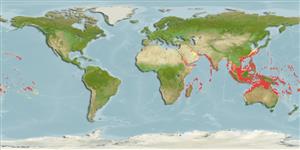Preferred temperature (Ref.
115969): 24.5 - 29, mean 28 (based on 2402 cells).
Phylogenetic diversity index (Ref.
82804): PD
50 = 0.5000 [Uniqueness, from 0.5 = low to 2.0 = high].
Bayesian length-weight: a=0.01349 (0.00896 - 0.02030), b=2.99 (2.87 - 3.11), in cm Total Length, based on LWR estimates for this species & Genus-body shape (Ref.
93245).
ระดับชั้นอาหาร (Ref.
69278): 4.3 ±0.5 se; based on diet studies.
ความสามารถในการกลับคืนสู่ปกติ (Ref.
120179): ขนาดกลาง, เวลาต่ำสุดที่จะทำให้ประชากรเพิ่มขึ้นเป็น 2 เท่าใช้เวลา 1.4 - 4.4 ปี (K=0.11-0.33; tmax=13).
Prior r = 0.41, 95% CL = 0.27 - 0.61, Based on 1 data-limited stock assessment.
Fishing Vulnerability (Ref.
59153): High to very high vulnerability (68 of 100).
Climate Vulnerability (Ref.
125649): Very high vulnerability (85 of 100).
